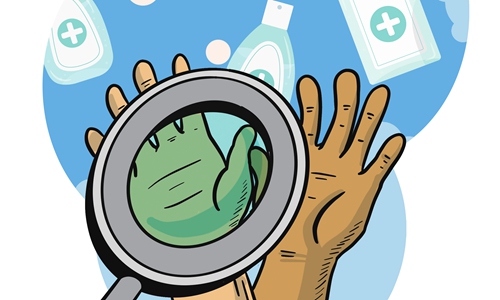HOME >> SOURCE
Hantavirus shows need for cooperation in public health
By Zhou Qing Source:Global Times Published: 2020/3/25 22:37:28

Illustration: Luo Xuan/GT
The death of a Chinese worker from the hantavirus has sparked wide attention, especially overseas. The virus poses very low risks, but, amid the coronavirus pandemic, it's a signal that developing countries, such as China and India, should invest together and cooperate in the public health field.
The Chinese worker from Yunnan Province, who was on the way back to Shandong Province on a chartered bus, tested positive for hantavirus and died on Monday. Another 29 people on the same bus with him tested negative for the coronavirus, and the hantavirus test results are still pending. The news was hyped and caused concern that another pandemic is coming while we are already in one.
But such concern is unnecessary. The hantavirus is mainly hosted by and contracted from rodents, which are rarely seen in cities nowadays. Unlike the coronavirus, the hantavirus passes among people through excreta and blood rather than the respiratory system. Also, there are vaccines to prevent the hantavirus.
As the story makes headlines, it is being taken seriously by Indian people rather than Chinese people. Aside from fear about another pandemic, it may also reflect doubt about whether India's public health conditions and facilities can weather another health emergency.
This is a question that puts every developing country and its public health system to the test, especially China and India with their high population densities. Due to poor public hygiene awareness and pollution, Chinese people have been vulnerable to virus outbreaks. Though the situation has significantly improved because of China's economic development, some Chinese people still follow the habit of eating wild animals, some of which are the hosts of the world's most dangerous viruses.
India, which has a population almost equivalent to China and still growing, has also faced difficulties. Going along a similar path as China, water supply and sanitation facilities have greatly increased in recent decades in India. However, despite the country's efforts, access to clean water, toilets and sewage systems are still an issue for Indian people.
The widespread coronavirus pandemic and short-lived hantavirus fear have once again taught us that a virus is an enemy faced by all of humanity. A virus usually lurks in the dark, but when it attacks, we need to be prepared and fight it. Countries such as China and India both have problems to address, and they should cooperate to improve the lives of their citizens and their public health systems.
After the coronavirus crisis is brought under control, countries worldwide are expected to face plight after economic shocks. This requires we are further united and work in concert. Economic stimulus plan could start with infrastructure and facilities investment in public health filed. With China's infrastructure capabilities and India's advantage in biotechnology industry, the two countries are expected to see further cooperation.
The author is a reporter with the Global Times. bizopinion@globaltimes.com.cn
Posted in: COLUMNISTS